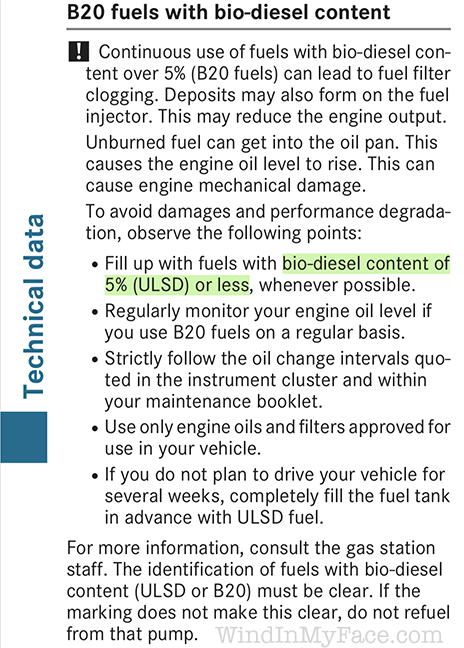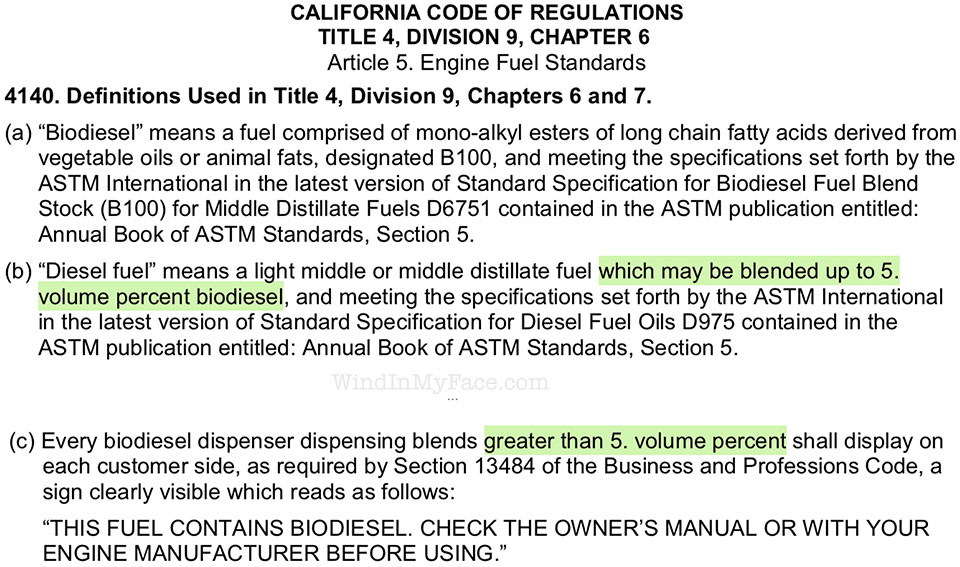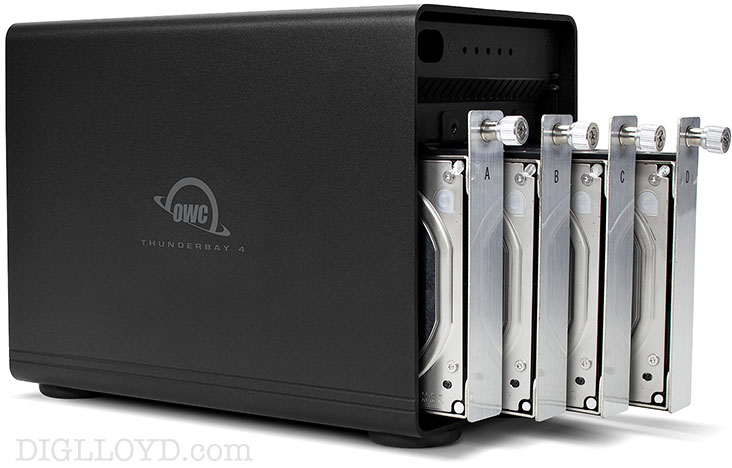
$220 SAVE $130 = 37.0% Western Digital 16.0TB Western Digital Ultrastar DC HC550 3.5-in… in Storage: Hard Drives
|

|

|

|

|
Mercedes Sprinter Maintenance: Biodiesel is the Kiss of Death for Your Sprinter
Related: biodiesel, diesel fuel, engine oil, Mercedes Sprinter, renewable diesel

Photographer and cyclist and Mac expert and software engineer Lloyd Chambers is available for consulting on general Sprinter considerations at his usual consulting rates via phone, or in person in the Palo Alto, CA area. Save yourself hours and mistakes by discussing issues up-front. More about Lloyd....
Biodiesel
As used here, biodiesel means what it has always meant: a low-quality diesel substitute that is best avoided. Mercedes deems “B5” (5% biodiesel) to be the acceptable limit, which is what you get in Diesel #2, at least in California. Anything more and Mercedes voids the engine warranty (“severe angine damage”).
Renewable diesel
Then there is renewable diesel aka “R100” which manufacturers claim are better then petroleum diesel, namely that it is chemically the same as petroleum diesel while burning cleaner (how can something the same be better?). See for example: What You Need to Know About Renewable Diesel.
In California, Propel Fuels is one company looking to gain traction with “Diesel HPR”.
Given that renewable diesel is around 5 ppm sulfur (vs 15 ppm for Diesel #2), and sulfur is a key lubricant, the lifespan of the fuel pump is of great concern, as well as anything else in the system that relies on sulfur for lubrication—Mercedes has documents that emphasize the lubrication issues involved of too-low sulfur. A fuel pump failure can be extremely expensive to fix and it can damage more than the pump—metal particles from a worn/failed fuel pump could cost $20K or more to fix all the damaged parts.
Until an objective study is presented of engines run in a fleet with petroleum diesel vs renewable diesel, owners should proceed with caution. One option is to use fuel additives with renewable diesel that raise sulfur to 15 ppm.
A fair study would run identical vehicles in a fleet for a year or two, then open and inspect the engines, comparing those that utilized petroleum diesel versus those that used renewable diesel. Along with the fuel pump, etc Or at least there should be independently audited claims as to maintenance over some period of time, at least 3 years and preferably five years.
Mercedes position on biodiesel and renewable diesel
Until and unless Mercedes signs off on R100 renewable diesel for Sprinter diesel engines, using it raises warranty issues. Mercedes is very clear that diesel containing more than 5% biodiesel voids the engine warranty, but what about using fuel that is 5 ppm sulfur instead of 15 ppm sulfur and thus has potential issues from inadequate lubrication?
However, renewable diesel apparently has some promise, as Mercedes has approved at least one type of renewable diesel for some engines:
MERCEDES-BENZ APPROVES HVO RENEWABLE DIESEL.
but it is not clear that Mercedes deems HVO diesel for the Mercedes Sprinter:
Not North America: Daimler says renewable diesel for Mercedes-Benz trucks only
See also: Renewable Diesel Fuel.
Biodiesel
Biodiesel is the kiss of death for a Sprinter diesel, notwithstanding the biodiesel industry-produced propaganda spread all over the internet, and internalized by every idiot who reads it, then regurgitated as if factual, particularly non-diesel and non-Sprinter owners. Or diesel owners (typically older diesels) who don’t have to deal with the extremely complex Sprinter diesel.
In a nutshell: biodiesel sludges up an engine quickly, including the oil separator PCV valve. It also makes things tough for the turbo, the EGR and swirl valves, the engine oil, etc. There is a reason that Mercedes will not honor the warranty for engine damage caused by using more than B5 (5% biodiesel). Mercedes discusses biodiesel risks in a PDF which is hard to find on the web, but see Biodiesel Information for Passenger Cars whose information matches another PDF I have for the Sprinter.
See also the PDF and its transcription at docplayer.net: Mercedes-Benz Biodiesel Brochure
- Clogging of fuel filter caused by a) soaps, which may be formed by biodiesel components (aging products and contaminants) b) microbes, which may contaminate biodiesel blends.
- Fuel gelling under cold climate conditions, e.g. additives of biodiesel and conventional diesel are sometimes incompatible.
- Sludge formation within engine oil due to biodiesel aging products.
- Increase in engine oil degradation when driving under low load conditions as biodiesel has difficulty evaporating from engine oil.
- Sticking /corrosion of high pressure pump parts / injectors especially after a longer stand-still period of the vehicle due to aging products of biodiesel (sticky polymers, acids).
- Nozzle coking / and injector deposits accelerated through by-products of biodiesel.
- Deposit formation on piston rings and also on lambda sensors, exhaust gas recirculation system parts.
- Biodiesel > B5 has a lower energy content than diesel fuel which results in a slight power loss and a slightly increased fuel consumption.
- ... Biodiesel content greater than B5 is NOT approved for Mercedes-Benz vehicles, hence no approved modification kit is available
Let’s translate this B20 discussion on page 280 of the 2018 Sprinter Operator’s manual:
- Fuel filter clogging means tow truck and new fuel filter. How nice is that in the White Mountains or northern Montana, where the nearest Mercedes dealer is 200 to 500 miles away?
- Mechanical damage from biodiesel getting into the engine oil.
- Strictly follow the oil change intervals really means do it 2X to 3X more often, unless you’re a Sprinter owner who thinks steady damage is just fine. And the low quality oil that Mercedes dealers use is not going to help matter.
- Fill the fuel tank with ULSD means stuff grows in biodiesel, which can make an even worse mess.
- Left unsaid are cold weather problems with biodiesel. Have fun getting towed 300 miles.
- Left unsaid is sludging inside the engine block, clogging of the oil separator PCV valve, sludging of the turbo and EGR, etc.
- Left unsaid is inferior mileage.
- Left unsaid is dubious biodiesel quality—very good (for biodiesel) to garbage.

Biodiesel in various states
See also Study of Hydrogenation Derived Renewable Diesel as a Renewable Fuel Option in North America.
High capacity, high-performance fault-tolerant storage for photography and video.
Non-RAID or RAID-0/1/4/5/10.
Capacities up to 72 Terabytes!
Midwest and nanny states
Many states, particularly states in the Midwest, just love to sell corn-derived inferior fuels by mandate (e.g., by force of law), so the internet is full of manufacturer-sponsored propaganda about just how great biodiesel is. Regulators step up and keep these companies in business that could not make it on the free market. In such states, you might be able to buy only B20 (20% biodiesel) or worse, which is not going to play well for the long-term or even medium-term engine health of the Mercedes Sprinter.
California
In California, it is legal to sell Diesel #2 containing up to 5% biodiesel without any labeling. So you’ll never know what you’re actually getting, and you’re stuck with the yuck. Even if you ask, the minimum-wage station attendant has no clue—you’d have to know where the fuel came from.
Read on for how to deal with biodiesel.

Dealing with Biodiesel
There are a number of ways to deal with biodiesel.
Change the oil frequently, using high-grade oil
Change the oil frequently, and talk to an expert (see that page) on how to clean up the engine, turbo, EGR, swirl valves, etc.
Simplest recommendation: change the oil every 4K miles using a high grade oil (not the stuff Mercedes uses), and always use a new Mercedes oil filter. See more details in Mercedes Sprinter Maintenance: Engine Oil. If there is no choice but to use B20 for several tanks of fuel, change the oil after 2K miles.
My experience is that Jiffy Lube will do a “drain and fill” for $30. Add about $20 for a genuine Mercedes oil filter, along with a high grade oil. With high-grade oil, this costs me about $130, plus $20 for a new oil filter. To stay compliant with Mercedes, use a compliant oil and genuine Mercedes oil filter and/or take it to a Mercedes dealer at the required service interval.
Calculate all your operating costs: if the interval is 4K miles, the operating cost per mile rises about 10% and that’s not even counting insurance costs and tires, etc—just fuel and BlueDef. So it is NOT a big cost to change the oil frequently.
Install a larger fuel tank
This by itself does nothing to address the biodiesel issue but a larger fuel tank extends the fill-up interval, which means being able to wait for B5 or better, avoiding B10 or B20 or (OMG) pure biodiesel.
Flush appropriately
I won’t go into details here, but sludge can be mostly cleaned up with appropriate protocols. If forced to run B20, this might be appropriate every 10K miles, even with frequent oil changes. Talk to the expert I mention on the Mercedes Sprinter Maintenance: Engine Oil page.
Seagate 22TB IronWolf Pro 7200 rpm SATA III 3.5" Internal NAS HDD (CMR)
SAVE $100




